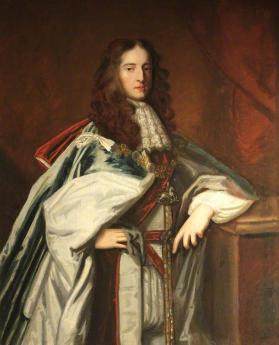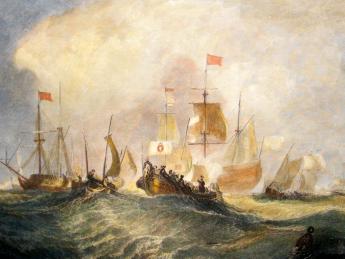Related Topics
Religious Philadelphia
William Penn wanted a colony with religious freedom. A considerable number, if not the majority, of American religious denominations were founded in this city. The main misconception about religious Philadelphia is that it is Quaker-dominated. But the broader misconception is that it is not Quaker-dominated.
Quakers: William Penn
Although Ben Franklin gets more ink lately, William Penn deserves at least equal rank among the most remarkable men who ever lived.
Glorious Revolution: Nov. 5, 1688

|
| William III of Orange |
The history of William III, or William of Orange, or the William of William and Mary, is mentioned in American history but not much noticed. In academic parlance, it's a topic which probably won't be on the test. By contrast, British schoolboys do learn a lot about Winston Churchill's ancestor the Duke of Marlborough who was William's commander against the French, and also the religious troubles William provoked in Ireland, but Britons mainly seem to express a bewildering relief that religious quarreling in England finally came to an end with the ascension of William and Mary to the throne. What the Irish thought about the same events is apparently just ignored. But what Pennsylvanians (and residents of Delaware and New Jersey, too) should mainly note is that when William came to the British throne, the era of William Penn's special protection by the Monarchy was over. Penn's heirs changed both their style and their religion, and worked hard to be friends of the King; but it was never going to be the same as it had been when Charles II made a promise to William Penn's father on his deathbed, that he would look after the troublesome boy.
The British populace had thought they became a Protestant nation under Henry VIII and solidified that situation under Elizabeth I. But somehow the religious issue violently re-arose under "Bloody" Mary and Cromwell. And even that was not enough; Charles II and his brother James II were secret Catholics, there seemed to be no end to this. An American gets the feeling that the British citizenry was more fed up with wrangling about Royal Religion than so much exercised about its theology. In any event, when James II produced a royal son who would almost certainly be raised a Catholic, it was just too much for most of his subjects. James just had to go.

|
| Landing at Torbay |
The most likely Protestant king available was William of Orange, the Dutch king. William himself was eager to have more allies for the Netherlands because the French king Louis XIV was busily swallowing up his weaker neighbors and the Netherlands were probably next. His wife, Mary, was the daughter of James II, so the legitimacy of his line was assured. Urged on by members of the British aristocracy and several powerful members of Parliament, he built a fleet which was alleged to be needed against Algerian pirates and soon set sail for England. Fearing French attack while his troops were in England, William had made extensive alliances in British military circles, and when he arrived he was more or less acclaimed, bloodlessly. For whatever reason, James II put up a very little fight was imprisoned briefly in a way that invited escape and left for France. And so William and Mary were victors in a bluffing game which James did not resist very hard, and were the monarchs of a Protestant nation. However, Ireland was Catholic and resisted, leading to bloody suppression which is still muttered about in Irish taverns, and fought over in Northern Irish elections.
Meanwhile, we all know what was happening to William Penn. He had a stroke, his steward in England and Logan in Pennsylvania "stole him blind", and the greatest private landowner in British history went to debtor's prison. Hardly any of this is imaginable under the Stuart kings. And for that matter, the later behavior of George III is not imaginable under the Stuart kings, either.
Originally published: Thursday, December 16, 2010; most-recently modified: Tuesday, May 21, 2019